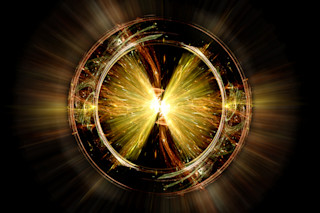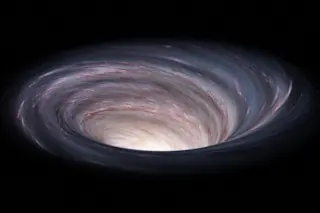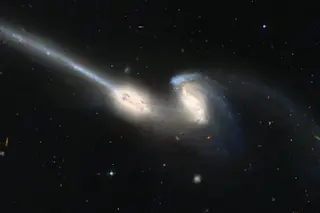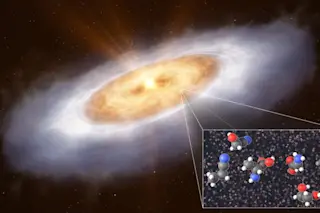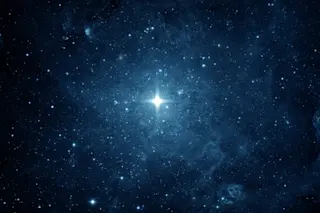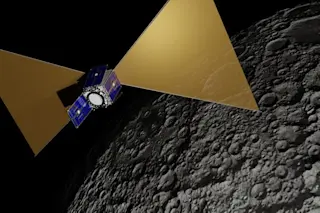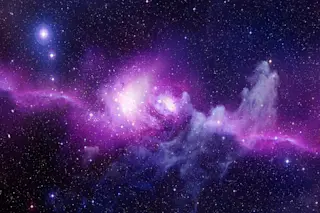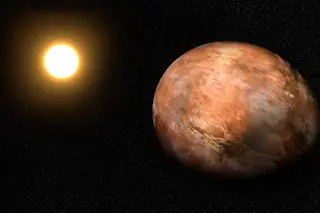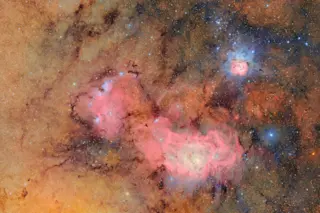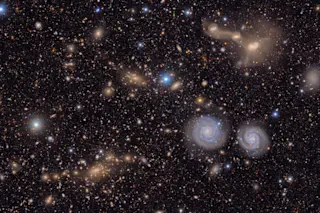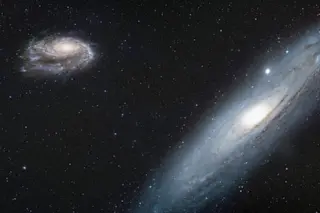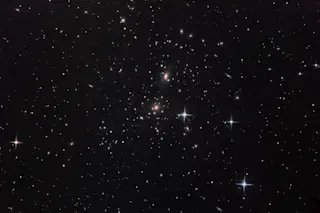The ultimate stability of the vacuum of our universe may rest on the masses of two fundamental particles, the Higgs boson — that inhabits all space and time — and the top quark. The latest measurements of those masses reveals that our universe is metastable, meaning that it can persist in its present state essentially forever… or not.
Vacuum Expectations
Our universe has not always been the same. In the earliest moments of the Big Bang, when our cosmos was a mere fraction of its current size, the energies and temperatures were enormously high that even the fundamental rules of physics were completely different. Most notably, physicists believe that at one time, all four forces of nature (gravity, electromagnetism, strong nuclear and weak nuclear) were merged into a single, unified force.
The nature of that unified force remains a mystery, but as the universe expanded and cooled from initial state, the forces peeled off from each other. First came gravity, then strong nuclear, and lastly electromagnetism and the weak nuclear force split from each other. That last step we can recreate in the lab. In our most powerful particle colliders, we can achieve the energies needed to – temporarily, at least – recombine those forces into a single “electroweak” force.
More on the Universe:
The observable universe spans an incomprehensible 92 billion light-years across and contains perhaps 2 trillion galaxies.
The theory of general relativity, under which space itself can curve, allows for the universe to take one of three forms: flat like a sheet of paper, closed like a sphere, or open like a saddle.
Each time the forces divided, the cosmos underwent a radical phase transition, populated by new particles and forces. For example, the unified electroweak force is carried by a quartet of massless particles, but the electromagnetic force is carried by a single massless particle, the photon, while three massive particles carry the weak nuclear. If those two forces hadn’t split, then life as we know it, which depends on electromagnetic interactions to glue atoms together into molecules, simply wouldn’t exist.
The universe has not undergone such a reshuffling of fundamental forces in over 13 billion years, but that doesn’t mean it’s not capable of playing the same tricks again.
The Deciding Higgs Boson
The current stability of the vacuum depends on how ultimate that splitting of the electroweak force was. Did that splitting bring the universe to its final, lowest-energy ground state? Or is it merely a pitstop on the road of its further evolution?
The answer comes down to the masses of two fundamental particles. One is the Higgs boson, which plays a major role in physics: Its existence triggered the separation of the electromagnetic and weak nuclear forces all those billions of years ago.
At first, when our universe was hot and dense, the Higgs stayed in the background, allowing the electroweak force to rule unimpeded. But once the universe cooled beyond a certain point, the Higgs made its presence known, and interfered with that force, creating a separation that has been maintained ever since. The mass of the Higgs boson determined when that splitting happened, and it regulates how “strong” that separation is today.
Read more: What Shape Is the Universe?
But the Higgs plays another major role in physics: By interacting with many other particles, it gives those particles mass. How strongly a particle connects to the Higgs governs that particle’s mass. For example, the electron barely talks to the Higgs at all, so it gets a light mass of 511 MeV. On the other end of the spectrum, the top quark interacts with the Higgs the most, making it the heaviest object in the Standard Model of particle physics, weighing in at 175 GeV.
In particle physics, particles are constantly interacting and interfering with all the other kinds of particles, but the strength of those interactions depend on the particle masses. So, when we try to evaluate anything involving the Higgs boson – like, say, its ability to maintain the separation between the electromagnetic and weak nuclear forces – we also need to pay attention to how the other particles will interfere with that effort. And since the top quark is handily the biggest of the bunch (the next largest, the bottom quark, weighs a mere 5 GeV) it’s essentially the only other particle we need to care about.
Stability of the Universe
When physicists first calculated the stability of the universe, as determined by the Higgs boson’s ability to maintain the separation of the electroweak force, they didn’t know the mass of either the Higgs itself or the top quark. Now we do: The top quark weighs around 175 GeV, and the Higgs around 125 GeV.
Plugging those two numbers into the stability equations reveals that the universe is… metastable. This is different than stable, which would mean that there’s no chance of the universe splitting apart instantly, but also different than unstable, which would mean it already happened.
Instead, the universe is balanced in a rather precarious position: It can remain in its present state indefinitely, but if something were to perturb spacetime in just the wrong way, then it would transform to a new ground state.
Read more: Where Is the Edge of the Universe?
What would that new state look like? It’s impossible to say, as the new universe would feature new physics, with new particles and new forces of nature. But it’s safe to say that life would be different, if not completely impossible.
What’s worse, it may have already happened. Some corner of the cosmos may have already begun the transition, with the bubble of a new reality expanding outwards at the speed of light. We wouldn’t know it hit us until it already arrived. Sleep tight!



